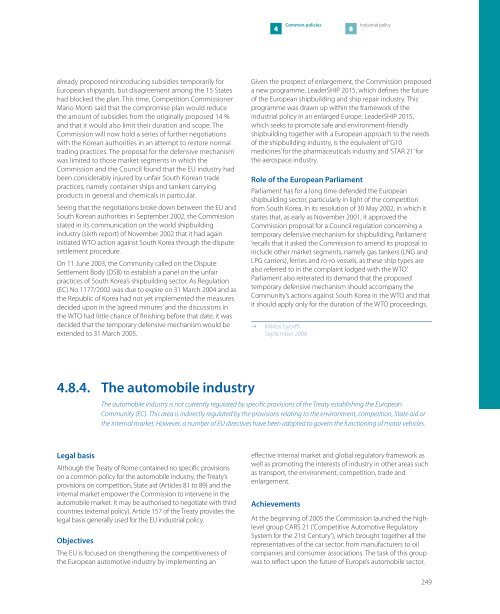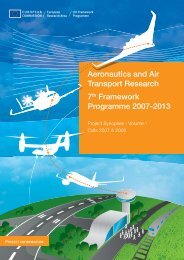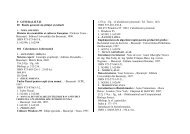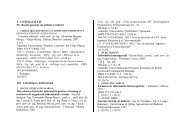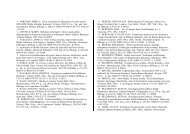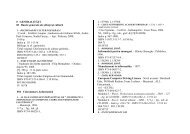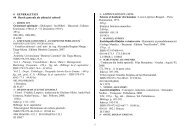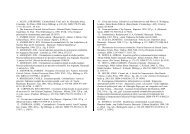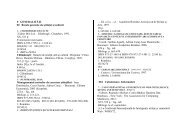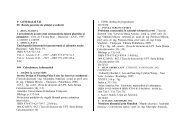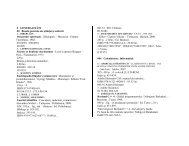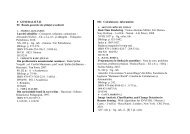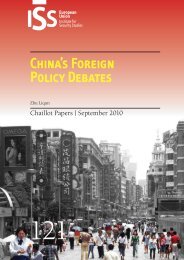Fact Sheets on the European Union â 2 - EU Bookshop - Europa
Fact Sheets on the European Union â 2 - EU Bookshop - Europa
Fact Sheets on the European Union â 2 - EU Bookshop - Europa
Create successful ePaper yourself
Turn your PDF publications into a flip-book with our unique Google optimized e-Paper software.
4 Comm<strong>on</strong> policies 8<br />
Industrial policy<br />
already proposed reintroducing subsidies temporarily for<br />
<strong>European</strong> shipyards, but disagreement am<strong>on</strong>g <strong>the</strong> 15 States<br />
had blocked <strong>the</strong> plan. This time, Competiti<strong>on</strong> Commissi<strong>on</strong>er<br />
Mario M<strong>on</strong>ti said that <strong>the</strong> compromise plan would reduce<br />
<strong>the</strong> amount of subsidies from <strong>the</strong> originally proposed 14 %<br />
and that it would also limit <strong>the</strong>ir durati<strong>on</strong> and scope. The<br />
Commissi<strong>on</strong> will now hold a series of fur<strong>the</strong>r negotiati<strong>on</strong>s<br />
with <strong>the</strong> Korean authorities in an attempt to restore normal<br />
trading practices. The proposal for <strong>the</strong> defensive mechanism<br />
was limited to those market segments in which <strong>the</strong><br />
Commissi<strong>on</strong> and <strong>the</strong> Council found that <strong>the</strong> <strong>EU</strong> industry had<br />
been c<strong>on</strong>siderably injured by unfair South Korean trade<br />
practices, namely c<strong>on</strong>tainer ships and tankers carrying<br />
products in general and chemicals in particular.<br />
Seeing that <strong>the</strong> negotiati<strong>on</strong>s broke down between <strong>the</strong> <strong>EU</strong> and<br />
South Korean authorities in September 2002, <strong>the</strong> Commissi<strong>on</strong><br />
stated in its communicati<strong>on</strong> <strong>on</strong> <strong>the</strong> world shipbuilding<br />
industry (sixth report) of November 2002 that it had again<br />
initiated WTO acti<strong>on</strong> against South Korea through <strong>the</strong> dispute<br />
settlement procedure.<br />
On 11 June 2003, <strong>the</strong> Community called <strong>on</strong> <strong>the</strong> Dispute<br />
Settlement Body (DSB) to establish a panel <strong>on</strong> <strong>the</strong> unfair<br />
practices of South Korea’s shipbuilding sector. As Regulati<strong>on</strong><br />
(EC) No 1177/2002 was due to expire <strong>on</strong> 31 March 2004 and as<br />
<strong>the</strong> Republic of Korea had not yet implemented <strong>the</strong> measures<br />
decided up<strong>on</strong> in <strong>the</strong> ‘agreed minutes’ and <strong>the</strong> discussi<strong>on</strong>s in<br />
<strong>the</strong> WTO had little chance of finishing before that date, it was<br />
decided that <strong>the</strong> temporary defensive mechanism would be<br />
extended to 31 March 2005.<br />
Given <strong>the</strong> prospect of enlargement, <strong>the</strong> Commissi<strong>on</strong> proposed<br />
a new programme, LeaderSHIP 2015, which defines <strong>the</strong> future<br />
of <strong>the</strong> <strong>European</strong> shipbuilding and ship repair industry. This<br />
programme was drawn up within <strong>the</strong> framework of <strong>the</strong><br />
industrial policy in an enlarged Europe. LeaderSHIP 2015,<br />
which seeks to promote safe and envir<strong>on</strong>ment-friendly<br />
shipbuilding toge<strong>the</strong>r with a <strong>European</strong> approach to <strong>the</strong> needs<br />
of <strong>the</strong> shipbuilding industry, is <strong>the</strong> equivalent of ‘G10<br />
medicines’ for <strong>the</strong> pharmaceuticals industry and ‘STAR 21’ for<br />
<strong>the</strong> aerospace industry.<br />
Role of <strong>the</strong> <strong>European</strong> Parliament<br />
Parliament has for a l<strong>on</strong>g time defended <strong>the</strong> <strong>European</strong><br />
shipbuilding sector, particularly in light of <strong>the</strong> competiti<strong>on</strong><br />
from South Korea. In its resoluti<strong>on</strong> of 30 May 2002, in which it<br />
states that, as early as November 2001, it approved <strong>the</strong><br />
Commissi<strong>on</strong> proposal for a Council regulati<strong>on</strong> c<strong>on</strong>cerning a<br />
temporary defensive mechanism for shipbuilding, Parliament<br />
‘recalls that it asked <strong>the</strong> Commissi<strong>on</strong> to amend its proposal to<br />
include o<strong>the</strong>r market segments, namely gas tankers (LNG and<br />
LPG carriers), ferries and ro-ro vessels, as <strong>the</strong>se ship types are<br />
also referred to in <strong>the</strong> complaint lodged with <strong>the</strong> WTO’.<br />
Parliament also reiterated its demand that <strong>the</strong> proposed<br />
temporary defensive mechanism should accompany <strong>the</strong><br />
Community’s acti<strong>on</strong>s against South Korea in <strong>the</strong> WTO and that<br />
it should apply <strong>on</strong>ly for <strong>the</strong> durati<strong>on</strong> of <strong>the</strong> WTO proceedings.<br />
g<br />
Miklos Györffi<br />
September 2006<br />
4.8.4. The automobile industry<br />
The automobile industry is not currently regulated by specific provisi<strong>on</strong>s of <strong>the</strong> Treaty establishing <strong>the</strong> <strong>European</strong><br />
Community (EC). This area is indirectly regulated by <strong>the</strong> provisi<strong>on</strong>s relating to <strong>the</strong> envir<strong>on</strong>ment, competiti<strong>on</strong>, State aid or<br />
<strong>the</strong> internal market. However, a number of <strong>EU</strong> directives have been adopted to govern <strong>the</strong> functi<strong>on</strong>ing of motor vehicles.<br />
Legal basis<br />
Although <strong>the</strong> Treaty of Rome c<strong>on</strong>tained no specific provisi<strong>on</strong>s<br />
<strong>on</strong> a comm<strong>on</strong> policy for <strong>the</strong> automobile industry, <strong>the</strong> Treaty’s<br />
provisi<strong>on</strong>s <strong>on</strong> competiti<strong>on</strong>, State aid (Articles 81 to 89) and <strong>the</strong><br />
internal market empower <strong>the</strong> Commissi<strong>on</strong> to intervene in <strong>the</strong><br />
automobile market. It may be authorised to negotiate with third<br />
countries (external policy). Article 157 of <strong>the</strong> Treaty provides <strong>the</strong><br />
legal basis generally used for <strong>the</strong> <strong>EU</strong> industrial policy.<br />
Objectives<br />
The <strong>EU</strong> is focused <strong>on</strong> streng<strong>the</strong>ning <strong>the</strong> competitiveness of<br />
<strong>the</strong> <strong>European</strong> automotive industry by implementing an<br />
effective internal market and global regulatory framework as<br />
well as promoting <strong>the</strong> interests of industry in o<strong>the</strong>r areas such<br />
as transport, <strong>the</strong> envir<strong>on</strong>ment, competiti<strong>on</strong>, trade and<br />
enlargement.<br />
Achievements<br />
At <strong>the</strong> beginning of 2005 <strong>the</strong> Commissi<strong>on</strong> launched <strong>the</strong> highlevel<br />
group CARS 21 (‘Competitive Automotive Regulatory<br />
System for <strong>the</strong> 21st Century’), which brought toge<strong>the</strong>r all <strong>the</strong><br />
representatives of <strong>the</strong> car sector: from manufacturers to oil<br />
companies and c<strong>on</strong>sumer associati<strong>on</strong>s. The task of this group<br />
was to reflect up<strong>on</strong> <strong>the</strong> future of Europe’s automobile sector,<br />
249


